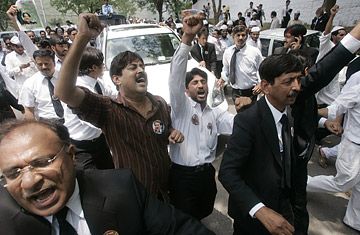
Lawyers chant slogans in front of the car of Pakistan's deposed Chief Justice Iftikhar Chaudhry as he leaves his residence in Islamabad on June 10
Pakistan's lawyers are back on the streets, but this time their protest challenges not only the isolated President Pervez Musharraf, but also the fragile opposition coalition that took power in February. Thousands of attorneys on Tuesday launched a long-anticipated protest drive from the central city of Multan to the capital, Islamabad, demanding the immediate restoration of 60 Supreme and High Court judges ousted last November by Musharraf. An estimated 50,000 lawyers, supported by political activists, civil society groups and religious parties from all corners of Pakistan, will converge in Lahore Wednesday evening to be addressed by Iftikhar Chaudhry, the deposed Chief Justice of the Supreme Court. The following morning they will proceed to Islamabad, 160 miles away, where they plan to finish either Thursday or Friday with a sit-in in front of Parliament.
The demand for the reinstatement of the judges sets the protesters on a collision course with both President Musharraf and the new government. Musharraf dismissed the Supreme Court bench when it agreed to hear challenges to the constitutionality of his reelection as President. But the question of how to reinstate the jurists has already precipitated a split between the two principal parties of the new government — Benazir Bhutto's Pakistan People's Party (PPP), now led by her widower Asif Zardari; and the Pakistan Muslim League, led by former Prime Minister Nawaz Sharif. Sharif wants the judges restored immediately and unconditionally through an act of Parliament. Zardari insists that the restoration of the judges should come only through constitutional changes, which could take months, if not a year, to implement. If the judges are reinstated, they could declare Musharraf's presidency invalid, or hear impeachment charges against him. But they could also revisit a controversial amnesty deal that freed Zardari and other PPP leaders from corruption charges that had been before the courts.
The rally, dubbed a "long march" even though the lawyers are traveling in a vehicle convoy and by air, began with hundreds of lawyers, clad in the now iconic uniform of a black blazer and white collared shirt, sweating in the 104-degree heat as they chanted slogans demanding Musharraf's ouster. Some rode camels. The crowds showered them with rose petals. It took nearly six hours for the protesters to traverse the one and a half miles from the Multan airport to the local High Court, where Chaudhry addressed the crowd: "If the courts are allowed to work independently, then I assure you, this country does not need to worry about any danger."
Not everyone agrees. The coming showdown on the steps of Parliament could provoke a crisis that threatens to put Pakistan in even greater danger, warns Samina Ahmed, Pakistan director of the International Crisis Group (ICG), adding that it could even provoke another military coup. "What we see happen in the next few days will determine wither democracy thrives in Pakistan, or if the country goes back to military rule," says Ahmed.
But Aitzaz Ahsan, the leader of the lawyer's movement and president of the Supreme Court Bar Association, is having none of it. On Tuesday, Ahsan made clear that the target of the latest protest is not simply President Musharraf, but also the Parliament elected in February. The legislators had dallied too long on the issue of restoring the judges, he charged, and the lawyers were no longer prepared to wait. "Now that [Musharraf's] wings are clipped and he is powerless, why waste efforts on trying to dislodge him?" Ahsan told TIME by phone from Multan. "The problem is the parliamentarians. They are claiming that they are sovereign and supreme, so obviously it is [their] own responsibility to restore the judges."
The delay advocated by the PPP is inexcusable, says lawyers' leader Ahsan. "You cannot construct the parliamentary process on the debris of the judicial structure. No Parliament, no democracy, can survive without an independent judiciary."
In the name of democracy, then, the lawyers are marching on parliament, warning that the legislature must immediately reinstate the judges or "face the music." But, warns the ICG's Ahmed, "the problem is that the leaders of this movement don't quite understand that by fighting for their cause in this way, they are actually undermining it." In February's election, she says, the people voted for politicians, not judges. Musharraf was weakened because Pakistanis overwhelmingly voted his party out of power, sending a clear message that he had no mandate. "The sole remnant of military rule has been pushed to the sidelines through the democratic process, so now they want to weaken the people who weakened him?" asks Ahmed. "There are going to be no winners in this confrontation."
The confrontation over the judges comes amid mounting social pressure. Pakistanis are frustrated with the mounting costs of basic foodstuffs, runaway inflation, an economy in free fall and a nationwide shortage of electricity. Many had hoped that restoring a democratic government after eight years of military rule would reverse Pakistan's troubles; instead, they have only increased. And the resulting impatience is being channeled into a movement against the new government, whose standing is not helped by its venal politicking and personal grudges. The danger in such situations, warns Ahmed, is that in the past they have provided an excuse for the military to seize power. She urges restraint on all sides. "The goal of an independent judiciary is something that is going to be essential to any stable transition," she says. "But more desirable than that goal is a functioning democracy. Because if military rule comes back in, how are you going to have an independent judiciary? Insisting that the chicken comes before the egg is not helpful."
The problem is, no one can agree which comes first.
